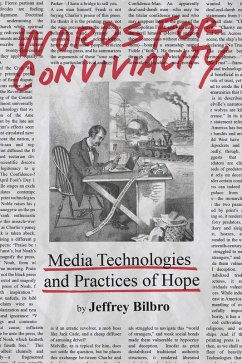The industrialization of print technologies in early nineteenth-century America transformed print culture in ways that parallel the transformation wrought by the digital revolution. Understanding how a previous era was shaped by the assumptions print technology engendered may enable us to recognize more clearly how our verbal habits and practices are formed and deformed by our enmeshment in digital technologies.
When powerful new verbal media come along, our options are not limited to naive optimism or resigned pessimism. And some of the most helpful guides in charting a path toward genuinely convivial modes of reading are the literary authors who lived through the antebellum industrialization of print. Those authors sought to understand the effects of technologies such as the telegraph and the steam-powered rotary printing press through the most fundamental tool that language provides: metaphor. Evocative metaphors are a potent way to raise cultural awareness regarding the hidden affordances and subtle nudges that are latent within dominant communications technologies.
The argument of Words for Conviviality follows a pilgrimage with three stages and considers a set of metaphors that such authors deployed to answer three underlying questions: What does industrial print tempt optimistic readers to imagine themselves as? What does it lead its victims to fear they will become? And what alternative metaphors might ground more convivial reading? The metaphors of hope that Jeffrey Bilbro discusses suggest that to wield textual technologies well, we need to develop cultural practices and institutions that strengthen our relationships with one another and our commitment to a common good. Instead of developing new technologies to solve the problems that technologies have caused, the authors considered here propose developing better readers--readers more attuned to the power of the textual technologies they use and better able to imagine and practice healthy, convivial forms of discourse. These authors obviously did not eschew industrialized print, and they did not simply give up on the technologies of their day. Rather, they developed metaphors that might inspire us to beat textual swords into plowshares.
When powerful new verbal media come along, our options are not limited to naive optimism or resigned pessimism. And some of the most helpful guides in charting a path toward genuinely convivial modes of reading are the literary authors who lived through the antebellum industrialization of print. Those authors sought to understand the effects of technologies such as the telegraph and the steam-powered rotary printing press through the most fundamental tool that language provides: metaphor. Evocative metaphors are a potent way to raise cultural awareness regarding the hidden affordances and subtle nudges that are latent within dominant communications technologies.
The argument of Words for Conviviality follows a pilgrimage with three stages and considers a set of metaphors that such authors deployed to answer three underlying questions: What does industrial print tempt optimistic readers to imagine themselves as? What does it lead its victims to fear they will become? And what alternative metaphors might ground more convivial reading? The metaphors of hope that Jeffrey Bilbro discusses suggest that to wield textual technologies well, we need to develop cultural practices and institutions that strengthen our relationships with one another and our commitment to a common good. Instead of developing new technologies to solve the problems that technologies have caused, the authors considered here propose developing better readers--readers more attuned to the power of the textual technologies they use and better able to imagine and practice healthy, convivial forms of discourse. These authors obviously did not eschew industrialized print, and they did not simply give up on the technologies of their day. Rather, they developed metaphors that might inspire us to beat textual swords into plowshares.
Dieser Download kann aus rechtlichen Gründen nur mit Rechnungsadresse in A, D ausgeliefert werden.









